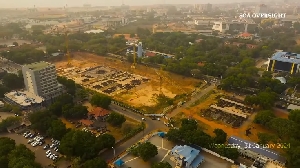 Aerial shot of the National Cathedral site
Aerial shot of the National Cathedral site
The construction of the National Cathedral in Ghana has sparked a debate among citizens regarding the allocation of resources and priorities of the government.
While some argue that the cathedral will serve as a unifying symbol and bring the nation closer to God, others believe that the massive amount of money being invested in the project could be better utilized to address pressing social and economic challenges facing the country.
The National Cathedral project, initiated by President Nana Addo Dankwa Akufo-Addo, aims to build a national place of worship that will serve as a symbol of unity and spirituality for the Ghanaian people.
The idea behind the project is to create a space where citizens can come together to pray, reflect, and seek solace in times of need. Proponents of the project argue that the cathedral will not only strengthen the country's spiritual foundation but also boost tourism and attract visitors from around the world.
However, the cost of building the National Cathedral has raised concerns among many citizens, especially in light of the country's high unemployment rate and economic challenges. The government has allocated a significant amount of money towards the project, with estimates suggesting that it will cost hundreds of millions of dollars to complete. Given the current state of the economy, with many Ghanaians struggling to make ends meet and access necessities, some feel that the funds could be better utilized to address more immediate needs.
It is no secret that Ghana is facing a high level of unemployment, with many young people struggling to find stable and well-paying jobs. The country's economy is also grappling with inflation and rising costs of living, making it difficult for many citizens to afford necessities such as food, shelter, and healthcare. The National Cathedral Project, while noble in its intentions, is seen by some as a misplaced priority in a country where many are in dire need of employment opportunities and social support.
In addition to the economic concerns, there are also questions raised about the necessity of a national cathedral in a country where there are already numerous churches and places of worship. Ghana is a deeply religious country, with a diverse mix of Christian, Muslim, and traditional belief systems coexisting peacefully. Many argue that the existing churches and mosques in the country are more than sufficient to meet the spiritual needs of the population and that the construction of a grand cathedral is not a priority at this time.
In light of these concerns, some citizens are calling on the government to reconsider its priorities and redirect the funds earmarked for the National Cathedral towards more urgently needed projects. Building infrastructure, investing in education and healthcare, and creating job opportunities are just a few examples of areas where the money could be better spent to benefit a larger segment of the population.
While the National Cathedral project may hold symbolic value for some, it is important to consider the practical implications of investing such a large sum of money in a single project. The government has a responsibility to prioritize the needs of its citizens and ensure that resources are allocated in a way that will have the greatest positive impact on society as a whole.
In conclusion, the National Cathedral Project in Ghana has sparked a debate about the allocation of resources and priorities of the government. While some see the cathedral as a unifying symbol and spiritual landmark, others argue that the money could be better spent addressing pressing social and economic challenges. Ultimately, the decision of how to allocate funds should be guided by the goal of improving the lives of all citizens and supporting the country's development sustainably and equitably.